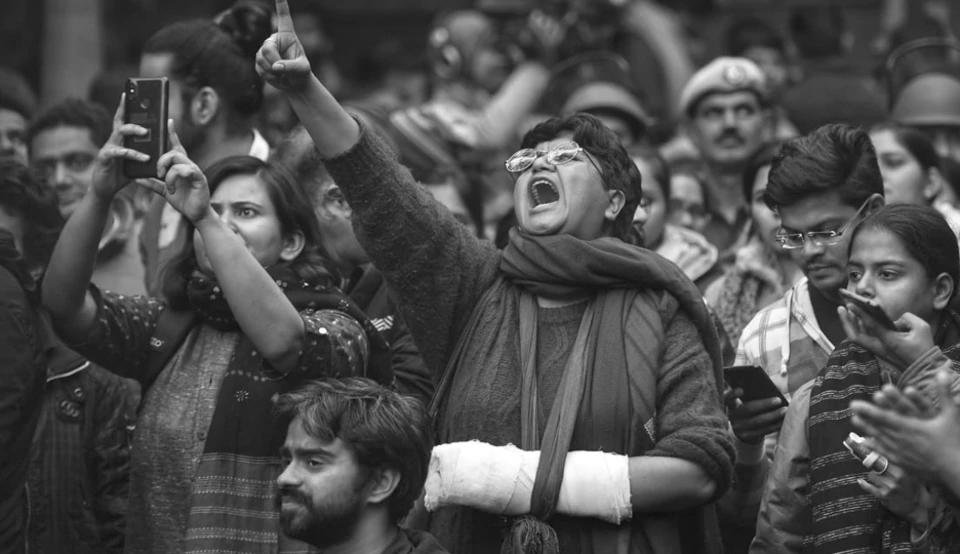Santosh Kumar Mohapatra
Jawaharlal Nehru University (JNU) was again targeted and witnessed unprecedented violence recently. The Left-leaning JNU Students Union (JNUSU) and the Rightist Akhil Bhartiya Vidyarthi Parishad (ABVP) blamed each other for the violence unleashed at night January 5.
Politicians across party lines, members of the civil society, and students from institutions of higher education from across the country and abroad, have all condemned the violence in JNU. Violence and brutality have no place in democracy. The question that arises in the context is: Who is to blame for the violence?
Although miscreants unleashed violence, it was the inaction of the police that allowed it to happen. Had Delhi Police not allowed the masked goons to enter the campus and later safe passage after creating mayhem, things would have been different. Delhi Police is not under the control of the state government; the Union home ministry controls it. The violence obviously had the clandestine support of the ruling party.
It is also alleged that the university administration was hand in glove with the attackers. JNU Teachers’ Association (JNUTA) accuses Vice-Chancellor Professor M Jagadesh Kumar of being responsible for the violence and has even sent an open letter to President Ram Nath Kovind demanding his removal. The vindictiveness of the university administration was manifest when it lodged a complaint against JNUSU president Aishe Ghosh and 19 others for attacking security guards January 5, instead of trying to arrest the miscreants.
Despite the violence on campus and the turmoil that followed, the V-C has still not been removed from his position. It appears he was authorised to act in this manner by the government itself.
In recent times, reprehensible attempts have been made to defame the teaching and learning traditions of JNU and its students’ union. The arrest of former JNUSU president and AISF leader Kanhaiya Kumar in 2016 on the false charges of sedition and criminal conspiracy; the appointment of ABVP leader Saurabh Kumar Sharma as assistant professor after awarding him PhD on the day of his viva-voce so as to make him eligible to apply for the said post despite the shortlisting committee having struck his name off; 12 emeritus professors, including former JNU vice-chancellor Asis Datta, noted scientist R Rajaraman and historian Romila Thapar being asked to submit their CVs to prove eligibility for the positions they hold; raising hostel fee by huge margins, which triggered student protests, all corroborate the despicable designs of the administration to refashion how JNU works.
The BJP has stated that educational institutions are centres of learning and will not be allowed to become “political addas” (centres of politics) at any cost. These sound preposterous as the BJP’s student wing itself is now alleged to have caused violence on the campus. Politics is not bad if it is in the interests of the masses. But politics should not involve crime.
The very purpose of encouraging student politics is to groom future leaders. There is no democracy without a history of student agitations against anti-democratic, anti-people attitude of the ruling class. But one sad reality is that almost all institutions of higher education in India today are plagued by political intrusions.
JNU is a reputed learning centre and brilliant students are believed to be competing to study there. They feel proud to be JNU alumna. The university’s alumni have risen to great heights at national and international levels and include the likes of Finance Minister Nirmala Sitharaman, External Affairs Minister S Jaishankar, Nobel laureate Abhijit Banerjee, and economists such as Tirthankar Roy, Ila Patnaik and Santosh Mehrotra.
The flare-up of the recent past is part of a surreptitious design by the present ruling class at the Centre to decimate leftist intellectuals and to pulverise the Left fortress that is JNU, whose atmosphere encourages progressive outlook, political consciousness, democratic values, independent and critical thinking abilities, reasoning, scientific temper, secularism, and the ability to expose the failures of the government through dissent and protest. That is why JNU students are dubbed as urban Naxals, anti-nationals and even traitors (“Deshdrohi”) by leaders of the BJP, RSS and their student wings.
Many renowned economists have critically analysed government policies and exposed their failures, much to the chagrin of right-wing parties and bodies such as the BJP and RSS who want to rule country by playing with religious sentiments of people. They want to create war hysteria and indulge in communal polarisation by creating issues using instruments such as the Citizenship (Amendment) Act, National Register of Citizens, and so on, instead of solving the economic problems the country is facing, such as hunger, poverty, inequality and unemployment.
The BJP government dislikes dissent in any form owing to the fear that it would lose popularity and vote banks. Although other people may exercise restraint in opposing wrong policies of the government, students are absolutely free to criticise government failures. After muzzling the mainstream media, appointing rightists to important positions in various regulatory bodies, and showing the door to those who don’t support or justify the wrong decisions of the government, such as demonetisation, the BJP feels student politics or left-leaning ideologues pose the biggest threat to its efforts to camouflage failures and hoodwink the masses by spreading lies and hatred.
That is why it wants to silence students, especially the left-leaning ones who have the guts to express dissent. That is also why it is targeting JNU which provides inputs and the necessary knowledge to expose the failures of the government.
The violence in JNU should not be looked at in isolation. Similar incidents earlier at Jamia Millia Islamia and Aligarh Muslim University were all part of the government’s clear-cut agenda of annihilating critical thinking, dissent and the voices of reason arising from universities.
–The writer is an Odisha-based economist. e-Mail: skmohapatra67@gmail.com.
